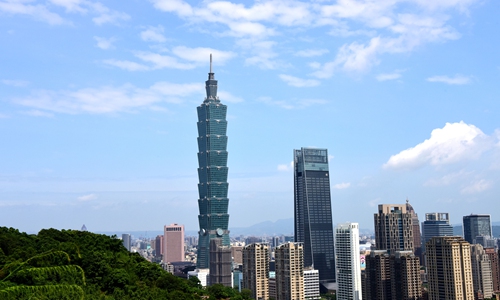DPP stirs opinions with water army
By Fan Lingzhi Source:Global Times Published: 2020/4/23 23:58:41
Revealing masterminds behind cyberattacks on mainland, WHO director

Taiwan regional leader Tsai Ing-wen (left) and YouTuber Potter King. Photo: Sina Weibo
Taiwan's "internet water army" sponsored by the separatist political party - Democratic Progressive Party (DPP), which is now ruling the island - has been actively leading the fight in the international public opinion field, despite their lack of international horizons.
Behind people like "Executive Yuan" member Audrey Tang Feng and internet influencer Yang Hui-ju, who are leaders of the "virtual army," the real leaders are Taiwan leader Tsai Ing-wen and the New Frontier Foundation (NFF), which is under the DPP's central party department, Chiu Yi, former Taiwan legislator and Director of the Taiwan Institute for Economic Research, told the Global Times.
Ghostwriter leaders
The NFF is a think tank that was founded in 1999, according to its website. However, Chiu noted that the post of the foundation's chairman is usually held by the DPP president, and many cyber ghostwriter leaders have held important posts in the foundation, so it is like a reservoir of talent for the DPP.
Although Tsai has stepped down from the post of DPP president, she still controls the NFF via her close friend Hsu Chia-ching.
Hsu is one of the few people who has the trust of Tsai. She has been treated by the public as an "avatar" for Tsai, who is not good at social interaction.
According to Chiu, the DPP decided to enhance its function with the "internet water army" after its disastrous defeat in the December 2018 election, and Hung Yao-fu, who had just resigned from the post of DPP secretary general, replaced Hsu as the agent for Tsai.
"I saw some contracts that the DPP central party department signed with some internet marketing companies, and I found that Hung is the person who signed these contracts on behalf of Tsai. So it is certain that Hung is the current leader of the internet water army."
Tsai suddenly gained a nickname of "Spicy Taiwanese Sister" at the beginning of 2019 and all DPP-friendly media on the island claimed that the title came from "Tsai's strong opposition to the one-China principle." But Chiu said that the title is a persona Hung created for Tsai after he took over the role of leader of ghostwriters.
The title has swept through the island. And Tsai's re-election win in January 2020 was described by Taiwan media as "the image of 'Spicy Taiwanese Sister' safeguarding sovereignty sending her back to power."
How did the cyber army operators manage to contribute a lot for Tsai's reappointment?
Marketing companies
Facebook user "night high hacker" is an expert in Taiwan social media. He told the media in a recent interview that the DPP had been cultivating ghostwriters in campus networks before it took office.
Those students entered the media industry after graduation. Some start their own media platforms, and gradually took the floor in the public opinion field and became an army for the DPP's publicity.
The DPP, after taking office, started to integrate them in various ways."
DPP entrusts internet marketing companies and change them frequently.
Chiu told the Global Times that the money is mainly from the central committee of the DPP, the other part is from regional governments under DPP rule.
"The cost to establish and run these companies is very low and strictly speaking, they are bogus companies. Using Tsai's administration as support, they can get funds easily," Chiu said.
The Global Times found from documents about one of these companies that its initial money was about NT$500,000 ($16,630).
"Marketing companies started to integrate the internet water army once they got funds," Chiu said. The first group they reached was internet influencers, which they define as netizens with more than 100,000 followers, such as 'curator' Chen Chih-han and bisexual YouTuber Zhong Ming-xuan."
The second group is composed of internet celebrities who have a lot of accounts such as Yang Hui-ju.
"Yang is not a big player but rather a mercenary," Chiu said. Yang's curses against World Health Organization (WHO) director-general Tedros Adhanom Ghebreyesus on Facebook, including words like "Negro" are still on her Facebook page.
According to Chiu, some new media platforms have been integrated, such as New Talk and Fount Media. These platforms receive material from the DPP to attack in the same direction. Internet celebrities will operate their accounts to lead public opinion.
Chiu said his social media account once received more than 50,000 attack messages that said nearly the same thing. Traditional media will follow from there. Apple Daily and Liberty Times will call to conduct interviews, and political commentary TV shows will follow to expand the speculation.
"One tiny speck will become a dark mass, which is what they would like to see."

Photo taken on July 21, 2019 from Xiangshan Mountain shows the Taipei 101 skyscraper in Taipei, southeast China's Taiwan. Photo:Xinhua
Public consensus on sand
The water army has attacked people ranging from WHO director-general Tedros to former NBA player Jeremy Lin, and this cyber bullying has shocked the international community.
Chiu believed such moves showed that the DPP was using the pandemic to seek space for its separatist agenda and wanted to join the WHO. Therefore, it became active on international social media platforms.
"But it is obvious that the management of such platforms is naive and chaotic, unlike on local platforms that they can fully master and have better control of," Chiu said.
The virtual army carries out missions from Tsai's administration and becomes her online fighters. The DPP does not mind the army's' dirty language and even encourages such indecency, making it unruly, analysts said.
Having checked the performances of the DPP's cyber army on local social media platforms and international platforms, the Global Times found subtle differences. For example, the rhetoric is much stronger on local platforms than on international platforms. At PTT, the internet army would be extremely bitter and harsh, using strong words such as "Nico" and "Nigga" to insult Tedros. However, on Twitter, it prefers to play poor, use milder words and pretend to be the weak group.
Some interviewees told the Global Times that compared with Twitter, Taiwan netizens are more used to using Facebook. The Global Times noticed that the DPP's cyber army used stronger and more aggressive language on Facebook than on Twitter.
Chiu explained the reasons for such differences. On one hand, the DPP 's cyber army has insufficient international vision, and it has a sense of strangeness in the face of international problems, which in turn leads to a sense of inferiority.
"Although they do not want to admit that they are frogs at the bottom of the well, they know in their hearts that the DPP is insignificant internationally, and the DPP cyber army is even more insignificant in the international arena. The sense of inferiority makes them use different terms, a self-abased tone in international platforms.
A typical example is during a verbal war between Chinese and Thailand netizens, some netizens apparently from Taiwan tried to rope in Thailand and Hong Kong netizens. They liked each others' posts and showed a seeming victory of "Taiwan and Hong Kong independence." Chiu called the scene a "public consensus built on sand."
"It is like a mirage, which looks colorful but is hollow inside," Chiu said, noting that it is fake public opinion. But it is difficult to make this clear in Taiwan, as many people on the island are engaged and being used as tools.
Why does the DPP connive with the water army and even make a fool of itself in the international opinion field? Chiu explained that it is because the DPP and Tsai do not really care about Taiwan entering the WHO, which they know is impossible, nor Taiwan's international image.
"All they want is to use the pandemic to seek independence and stir up anti-China emotions."
"The DPP is using anti-China emotions in the US and in the West in general to create a fake victory," Chiu said.
Some Western senators would voice support for Taiwan to enter the WHO after accepting money from Tsai. Taiwan media will hype the act, while the internet water army creates the false impression that there are wide supportive voices for Taiwan separatism.
"Taiwan netizens definitely will get excited after seeing these news reports and this is why nowadays, Taiwan youngsters are 'born pro-separatists.' So the DPP has to continue to stir up battles, collude with international anti-China forces, and encourage Taiwan netizens to join in for spiritual pleasure. The only ones who can benefit from this are the DPP and the internet marketing companies working with them."
Posted in: SOCIETY